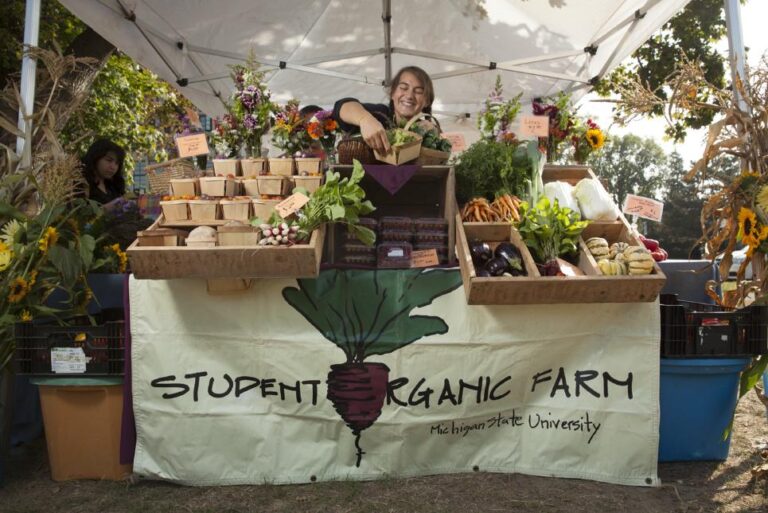These Colleges Farm to Feed Their Neighbors

At many colleges and universities across the country, students are receiving an education that extends far beyond textbooks and classrooms. College farms and gardens are increasing in popularity nationwide as universities discover the far-reaching benefits of creating outdoor spaces where students can get their hands in the dirt, and entire communities can benefit from the fruits of their labor.
Here are a couple of examples from Kentucky and Mississippi:
Berea College Farm & Farm Store
Berea College in Kentucky has one of the oldest continuously operating student educational farms in the U.S. It’s a 500-acre living laboratory where Berea College students in the Agriculture and Natural Resources program get hands-on experience producing vegetables, fruits, herbs, grains, honey bees, beef cattle, hogs, chickens, eggs, goats and even fish in the college’s aquaculture facility. Their farm products are all sold locally, both to the college’s dining hall and to the public through the Farm Store on campus.
“The farm has been part of the college since its inception in 1855,” says Jessa Turner, office and farm marketing manager for the Berea College Farm & Farm Store. “Since Berea College has always been tuition-free, students have had to work in exchange for their education, and feeding the student body was one of the most important jobs on campus. The farm is overseen by a dedicated crew of faculty and staff who mentor and guide the students on everything from crop production and livestock management to value-added food production and marketing.”
The Berea College Farm rents garden plots to the community and offers u-pick berries to the public, but all components of the labor program are conducted by students.
“Everyone benefits from the farm,” Turner says. “Students get an invaluable education that can be taken with them wherever they go in life, but our ripple effect is far and wide. Our food is served in the campus dining hall, local chefs have access to the freshest meat and produce grown within a few miles of their restaurants, and the food bank is the recipient of our surplus. Locals and visitors can shop at the Farm Store.”
At the Farm Store, students focus on adding value to their raw goods, such as turning grain into bread, vegetables into soup and fruits into desserts. The Farm Store is also a retail outlet for neighboring producers to sell their goods.
“Some of our nonfood projects include turning waste vegetable oil into biodiesel that is used in our tractors, turning food waste from the cafeteria into usable compost, and making candles, lotion, soap and lip balm from honeycomb wax,” Turner says.
Meridian, MS “Love and Peas” Community Garden
Culinary students at Meridian Community College in Mississippi don’t just learn how to cook – they also grow and harvest their own herbs and ingredients at Meridian’s community garden called “Love and Peas.” Used by students at both Meridian Community College and Mississippi State University-Meridian, the community garden is sponsored by Go Green Meridian, a chapter of Gaining Ground Sustainability Institute of Mississippi.
Gail Barton, a retired MCC horticulture instructor, serves as director of the garden.
“We broke ground in a pasture in August 2013, prepared beds and planted a fall/winter garden,” Barton says. “Our cool season garden included collards, kale, broccoli, pak choi, cabbage, radishes, carrots, lettuce, mustard, Irish potatoes and peas.”
The garden is maintained by both students and community members, who meet at the garden to plant and weed. When the plants are ready to harvest, those who have volunteered there can come pick what they want.
In 2014, the Love and Peas garden formed a partnership with MSU-Meridian to grow most of their summer bedding plants (including tomato, pepper, eggplant and basil) in the university’s greenhouse. In early spring, Barton and MSU-Meridian biology instructor Dr. Jarrod Fogarty planted some 1,500 seeds at the greenhouse, which were moved to the community garden six weeks later.
“For now, our main role is to provide a greenhouse to sprout seedlings,” Fogarty says. “What I enjoy most is introducing people to gardening who have limited or no experience with it. I think it will be important in the future to have as many people as possible in the community who can grow their own food or know where to buy locally grown food.”
